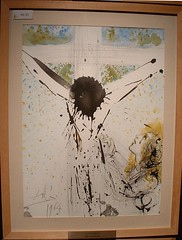 Image by Happy A via Flickr
Image by Happy A via Flickr
This is part of a series of posts based on the Churches Together in England publication one light: one world. If you click on the link you will find the biblical texts. This post of the same name covers the purpose of this series.
John 11: 49 - 52
Reading the passion narratives, it is obvious Jesus unites not his friends (they run away) but his enemies. What united them? Caiaphas does not speak for himself alone. He's named because he was High Priest that year. Those he represents agree because they are fearful of the Romans (v48).
The passion narratives show us the reality of human political and religious systems. They will dispose of an awkward individual because they are under threat. Make no mistake, their fear is not for the people but for their own power base. We have seen this caricatured in recent weeks by General Gaddafi's self-serving rhetoric.
Of course, the reason CTE has chosen this passage is v52. The idea is Caiaphas prophesied the gathering into one of 'the dispersed children of God'. So, what are we to make of this?
First, whatever it means it is obvious John is reading post-resurrection learning into his account of events. So, why are the children dispersed? We cannot divorce our understanding of this text from the passion narrative. It is about oppression. The children of God are dispersed because they are oppressed. This story is uniting them, so they may act as one people.
These days in England, the children of God are neither oppressed nor dispersed. They are not a people on the margins, but a people at the power centres. To a degree, adepts themselves at oppression and dispersal.
We see the Christians in the Middle East suffering because of the activities of Western Christians, alienating the settled religious peoples and causing conflict between them.
What really divides Christians is power.


Comments